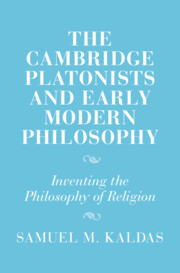Book contents
- The Cambridge Platonists and Early Modern Philosophy
- Cambridge Studies in Religion and Platonism
- The Cambridge Platonists and Early Modern Philosophy
- Copyright page
- Dedication
- Contents
- Acknowledgements
- Note on the Text
- Abbreviations
- Introduction: The Cambridge Platonists and Philosophy of Religion
- Part I The Origins of Cambridge Platonism
- Part II Rival Conceptions of God and Goodness:
- Part III The Religious Epistemology of the Cambridge Platonists
- 8 Reason and the Mind of God:
- 9 Deification as Spiritual Sensation:
- 10 Liberty, Violence and Practical Reason:
- Conclusion: The Cambridge Platonists as Early Modern Christian Platonists
- References
- Index
8 - Reason and the Mind of God:
Platonic Religious Epistemology
from Part III - The Religious Epistemology of the Cambridge Platonists
Published online by Cambridge University Press: 09 May 2024
- The Cambridge Platonists and Early Modern Philosophy
- Cambridge Studies in Religion and Platonism
- The Cambridge Platonists and Early Modern Philosophy
- Copyright page
- Dedication
- Contents
- Acknowledgements
- Note on the Text
- Abbreviations
- Introduction: The Cambridge Platonists and Philosophy of Religion
- Part I The Origins of Cambridge Platonism
- Part II Rival Conceptions of God and Goodness:
- Part III The Religious Epistemology of the Cambridge Platonists
- 8 Reason and the Mind of God:
- 9 Deification as Spiritual Sensation:
- 10 Liberty, Violence and Practical Reason:
- Conclusion: The Cambridge Platonists as Early Modern Christian Platonists
- References
- Index
Summary
The Cambridge Platonists’ anti-Calvinism was undergirded by a Platonic epistemology of participation – an epistemology on which the faculty of reason allowed the soul to participate in, and thereby come to know, the nature of God. This epistemology, drawn largely from Plotinus, enabled them to defend and articulate their reasons for rejecting the arbitrary, voluntarist picture of God propagated by their Calvinist contemporaries, and defend their own, rival conception of God as unswervingly committed to communicating his overflowing goodness to all his creatures. The central component of this Platonic epistemology is a high view of human reason as a direct participation in the divine nature, where beauty, goodness and truth are inseparably united. This chapter introduces the Cambridge Platonists’ religious epistemology by highlighting the ways in which they make conformity to God, both through purity of mind and virtuous action, a precondition for knowledge of God, resulting in a distinctive combination of Plotinian epistemology and Puritan spirituality.
Keywords
- Type
- Chapter
- Information
- The Cambridge Platonists and Early Modern PhilosophyInventing the Philosophy of Religion, pp. 213 - 236Publisher: Cambridge University PressPrint publication year: 2024

